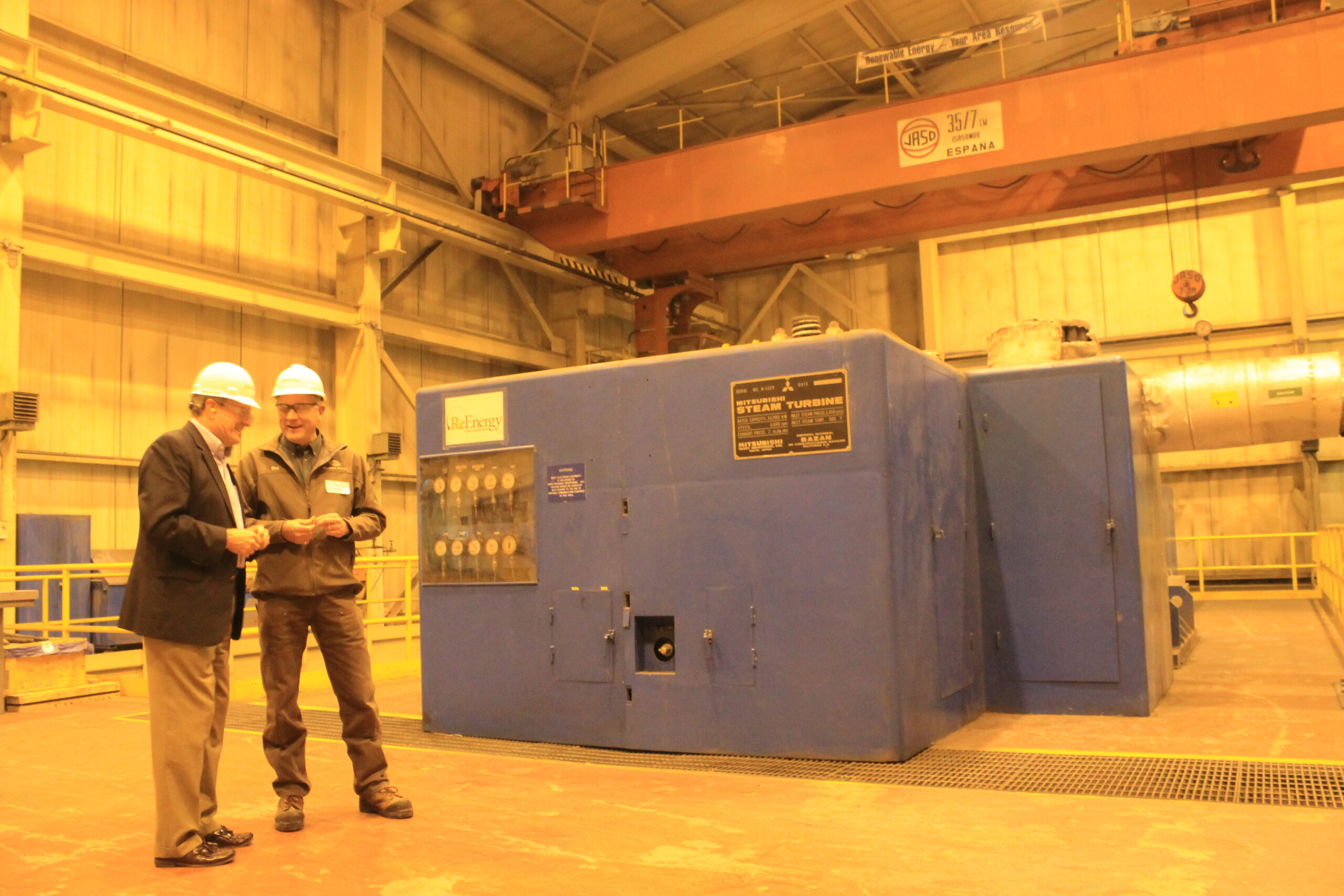
FORT FAIRFIELD, Maine — ReEnergy and Emera Maine have reached an agreement over electricity transmission charges for ReEnergy’s two Aroostook County biomass plants, although the Fort Fairfield plant is still at risk of closing this year.
The agreement calls for the utility company to provide a discount on grid transmission charges for sending ReEnergy’s power from northern Maine’s grid to the ISO-New England grid, ReEnergy said in a statement.
Under the agreement, Emera Maine will seek approval from the Federal Energy Regulatory Commission to reduce the charges to $0 per megawatt-month from Oct. 1, 2018 to Dec. 31, 2019, and to $1,132 per megawatt-month from January 1, 2020, to December 31, 2020. The reduction to $0 represents a 100 percent decrease from current charges, while the second phase will be a 75 percent discount, according to the ReEnergy statement.
The transmission charges have been levied due to northern Maine’s grid being separate from the greater New England grid, which ReEnergy uses to send power to Connecticut under a renewable energy credit program. To send power south, the electricity first must be “wheeled” through New Brunswick’s power grid by Emera.
With the value of those renewable energy credits dropping, in addition to increased competition to biomass facilities from lower priced natural gas, the transmission charges have been a major challenge to ReEnergy’s goal of maintaining financial sustainability at the two biomass plants in The County.
The two plants are a crucial link in Aroostook County’s $1.5 billion forestry industry, generating electricity from wood chips and residues purchased from lumber mills and loggers. The two facilities generate enough electricity to power about 71,000 homes and employ 45 people directly.
“We appreciate the effort undertaken over the past several months by Emera Maine, Aroostook County stakeholders, and the Maine Public Utilities Commission and we are pleased with Emera’s decision to reduce transmission charges paid by ReEnergy’s facilities in Ashland and Fort Fairfield through 2020,” said ReEnergy CEO Larry Richardson in a press release.
The Professional Logging Contractors of Maine also praised the agreement as a benefit to northern Maine loggers.
““This announcement is great news for the forest economy value chain in northern Maine, including hundreds of Maine loggers and truckers who rely on ReEnergy’s biomass facilities in Ashland and Fort Fairfield as a critical market for low grade wood that is produced in selective, sustainable timber harvesting,” said PLC executive director Dana Doran in a press release. “This is also vital to Maine’s loggers and truckers because if the mills cannot dispose of their byproducts, then the entire value chain is disrupted.”
Emera Maine spokesperson Judy Long said the utility company has been working with industry stakeholders in northern Maine “to determine the best course of action” following a request for a transmission discount from ReEnergy.
“In an effort to bring about the best outcome for the northern Maine economy and the highest utilization of the transmission system while maintaining fair and reasonable rates, Emera Maine is filing a request with FERC for a transmission discount for ReEnergy’s Fort Fairfield and Ashland plants,” Long said in an email.
The deal over the transmission charges “secures the near-term future of the Ashland facility,” ReEnergy said in a press release. It also positions the Fort Fairfield plant to make a “compelling proposal” for an energy sales agreement with the Maine Public Utilities Commission, the company said.
Since March 2017, ReEnergy has had an energy sales agreement with Emera Maine under a procurement process with the MPUC that allows ReEnergy to receive above-market prices for a portion of the power from the Ashland and Fort Fairfield plants.
However, the Fort Fairfield biomass plant is in danger of closing indefinitely if another energy sales contract is not secured, the company said.
“As a business necessity, in early August ReEnergy will need to commence a process to reduce fuel deliveries to the Fort Fairfield facility in anticipation of a potential cessation of operations in October,” the company said in its press release.
“If the facility is awarded an energy sales agreement before that time, normal fuel deliveries would resume and the facility would continue operating. If the facility has not received word by that time, it will terminate operations and resume operating if a successor agreement is awarded. If the facility is not awarded a successor agreement, it will terminate operations indefinitely.”
ReEnergy acquired the two Aroostook plants in 2011, and said in the recent release that the Ashland and Fort Fairfield facilities are in different situations.
The Ashland plant was renovated in 2014, has a larger economy of scale, can handle a more diverse fuel mix and also is located close to the large working timberlands of the North Maine Woods.
The Fort Fairfield plant, meanwhile, is in need of capital investments for renovations in the near-term, ReEnergy said. Twenty-six people work at the Fort Fairfield plant, and keeping it open wouldn’t be feasible without an energy sales contract, the company said.
And for both plants to be financially sustainable in the long-term, ReEnergy is aiming to have new business partners in the form of “co-located” enterprises that use the plant’s electricity, steam and heat. Such co-located businesses could span anything from heated greenhouses and aquaculture facilities to advanced woods products and chemical manufacturing.
Currently, ReEnergy said it is “having advanced discussions with companies interested in co-locating next to its biomass facilities.” The company operates four plants in Maine, with the other two situated in Livermore Falls and Stratton. Co-location proposals were originally solicited last fall for all four sites. Company officials said that every site has received a proposal.
The co-location projects could bring new economic diversification and jobs to Aroostook County’s forestry industry, as well as revenue certainty for ReEnergy.
Each project, however, could take “at best” two years to get off the ground, and that’s why an energy sales contract is needed, ReEnergy said.
“The prospect of a co-located project is much stronger if the biomass plant remains in operation and the fuel supply infrastructure remains in place during this development period,” the company said.
- The ReEnergy biomass plant in Fort Fairfield, seen from Route 1A, generates about 260,000 megawatt-hours of electricity each year, enough to power about 34,000 homes. (Anthony Brino)





